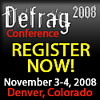 Next week I’ll be in Denver, attending Defrag, a boutique, intellectual, intense, very participatory conference. I’m attending despite the fact that I’ve cut down on conference attendance, not because of the current economic turmoil, but largely due to burnout. After a while they just all feel the same: empty session rooms, bored exhibitors, people just enjoying ad-hoc hallway conversations. But there is something intriguing about Defrag: friends and smart minds I respect keep on tweeting about Defrag, and the agenda just looks exciting.
Next week I’ll be in Denver, attending Defrag, a boutique, intellectual, intense, very participatory conference. I’m attending despite the fact that I’ve cut down on conference attendance, not because of the current economic turmoil, but largely due to burnout. After a while they just all feel the same: empty session rooms, bored exhibitors, people just enjoying ad-hoc hallway conversations. But there is something intriguing about Defrag: friends and smart minds I respect keep on tweeting about Defrag, and the agenda just looks exciting.
- I’ve always enjoyed reading Paul Kedrosky, whose posts deliver the punch in just a few words – or an image. I’ve never met him, so I’m looking forward to his keynote.
- Howard Lindzon’s keynote, titled It’s Always a Good Time to Start a Web Business will no doubt have a very special meaning in the current economic situation.
- I’m really, really looking forward to the next keynote, Getting Into the Flow Applications – a subject I somewhat touched upon, and likely will re-visit before heading to the conference.
- The first breakout session will be a huge dilemma: I literally should split myself in two halves, I badly want to attend both Dis (and Re)-aggregating the Web with Disqus, Intense Debate and my6sense, but I can’t miss Re-imagining the metaphors behind collaborative tools with Atlassian, Mindtouch, Liquid Planner, One Place either. (Update: now I really can’t miss it, as I’ll be moderating this session.)
I could go on, but I’ve just realized I’d literally have to duplicate the entire Agenda here. Have I just discovered Defrag’s secret sauce? Conferences are never about sessions, it’s all about the ad-hoc networking, even lobbycon-ing – yet I find myself wanting to attend most sessions, in fact two of them in most of the breakouts. Defrag promises amazing intellectual content, and if I just follow Twitter, an extraordinary group of innovators plan to attend. From what I hear, this is the conference where the attendees participate just as much as the speakers.
Do yourself a favor, check out the Agenda, read Eric’s 10 reasons to come to Defrag and register. (Use discount code “zoli1” to receive $300 off).
Update: Microsoft’s PDC is in full force today, and guess what, the conference wi-fi is failing. This seems to be the fate of all conferences, including ironically Web 2.0 Expo. The only exception I’ve seen so far is the Office 2.0 Conference, which teamed up with Swisscom to build rock-solid wi-fi. What is less known though, that they got the tip and contacts from Defrag organizer Eric Norlin. Yes, Defrag, working with Swisscom was the first conference to provide industrial-strength, reliable wi-fi throughout the entire site, including rooms in the conference hotel, the Hyatt Regency. So if you come to Defrag, you’ll be connected 24/7. (OK, just 24/2: Nov 3-4th )
)

 Three weeks ago I
Three weeks ago I  The interface is familiar from good old JotSpot (as a sidenote, the old JotSpot accounts are still alive at name.jot.com). There’s a basic wysiwyg editor, the Edit button is large and visible, and so is the New Page button. Good old JotSpot had several more ways of creating new pages, which are gone – perhaps for the best:
The interface is familiar from good old JotSpot (as a sidenote, the old JotSpot accounts are still alive at name.jot.com). There’s a basic wysiwyg editor, the Edit button is large and visible, and so is the New Page button. Good old JotSpot had several more ways of creating new pages, which are gone – perhaps for the best: )
)
 ) Google now has a pretty good and easy web-page creator with some wiki features made user-friendly, and a half-hearted attempt at integrating the rest of the Apps empire using Sites. Perhaps they get it right in the next release.
) Google now has a pretty good and easy web-page creator with some wiki features made user-friendly, and a half-hearted attempt at integrating the rest of the Apps empire using Sites. Perhaps they get it right in the next release.

Recent Comments